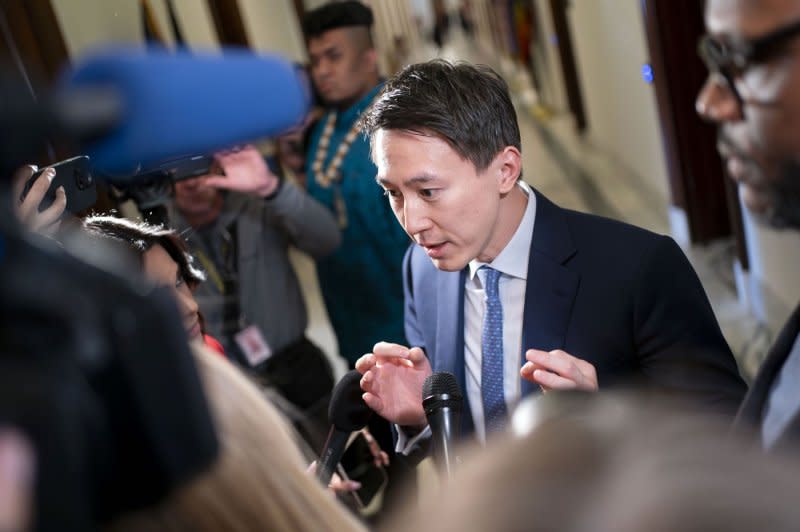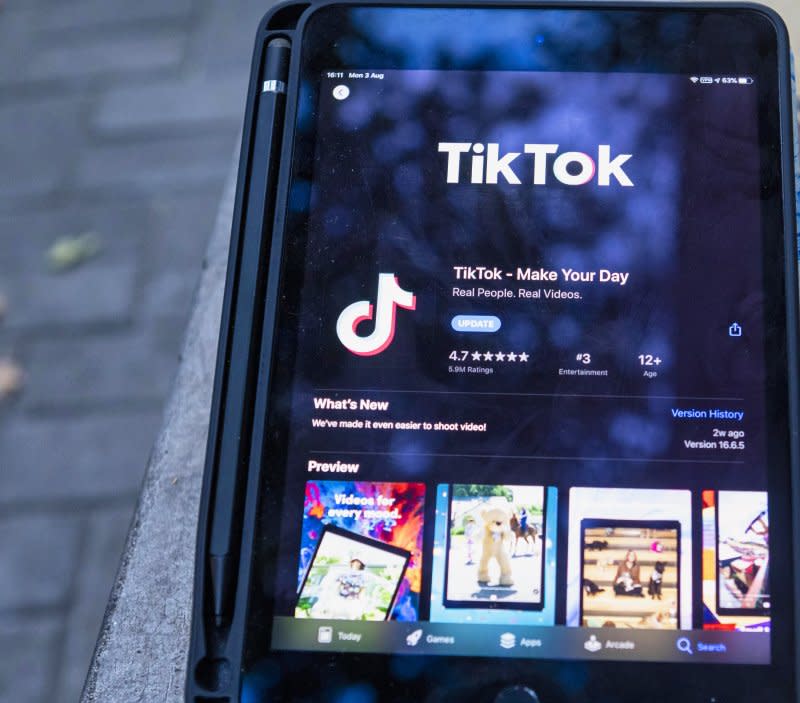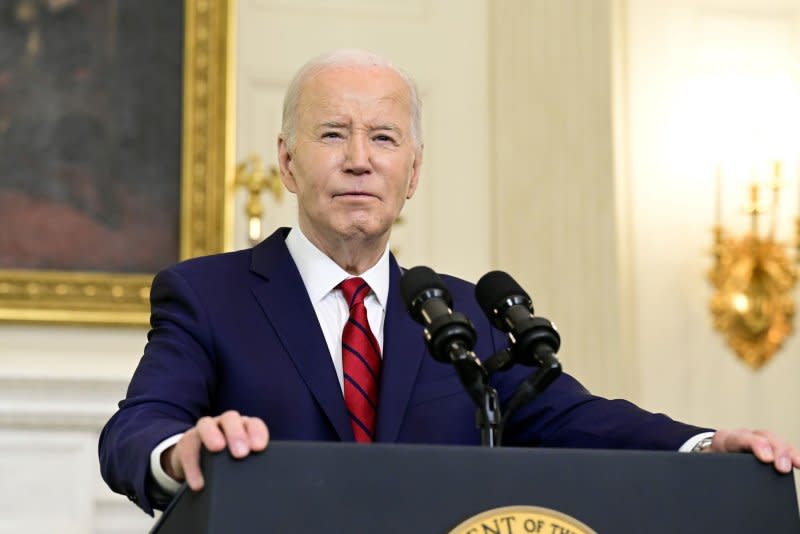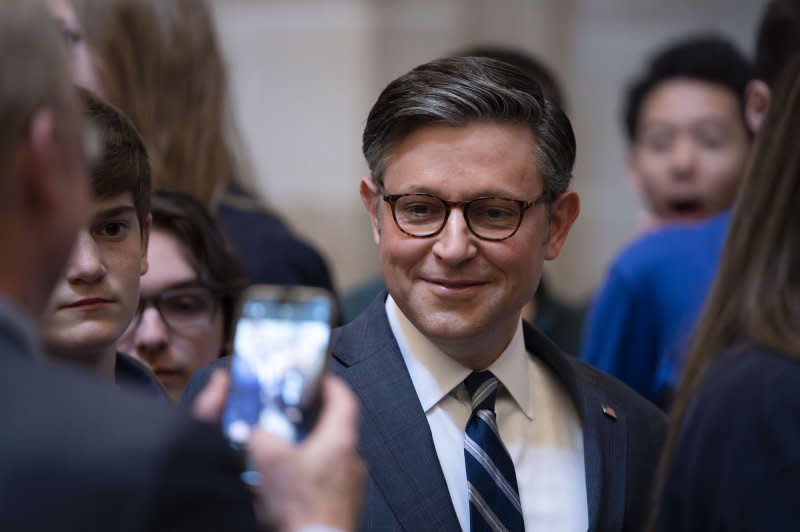TikTok ban: U.S. plan to force sale faces First Amendment, logistical hurdles

April 26 (UPI) -- President Joe Biden signed into law this week a measure that could lead to a ban on TikTok in the United States.
The TikTok law urges the app's Chinese owner, ByteDance, to divest from the platform within a year or it will be banned in the United States. Before a forced sale takes effect, experts expect TikTok to take legal recourse.
TikTok has cited the argument that banning or forcing the sale of the company would be a First Amendment violation. Norman Bishara, professor of business law and ethics in the Stephen M. Ross School of Business at Michigan, told UPI this is likely to be the path the company takes to argue against the U.S. government.
Also on Friday, ByteDance said it would not sell its U.S. interests in the face of the ban threat, denying a report that it was exploring a sale of the platform without its algorithm that recommends videos to users.
First Amendment argument

"The First Amendment argument is probably the topline one here that we've seen before from TikTok," Bishara said. "It's definitely part of TikTok's lobbying strategy. You can imagine if you're TikTok you're really feeling a bit under assault here."
The TikTok measure was included in a $95 billion package to commit foreign aid to Ukraine, Israel and Taiwan passed the U.S. House and Senate with overwhelming support before being signed by Biden.

Previous attempts to ban TikTok in standalone bills failed. Former President Donald Trump signed an executive order to force ByteDance to sell TikTok but it was overturned in court.
The app's estimated 1 billion worldwide users, including about 170 million in the United States, have grown to use TikTok to stay informed along with staying entertained. News is shared across the app, including by major, regional and local news organizations.

Users also share original content from music to comedy routines. They advertise their businesses and sponsored products. They have also organized behind a variety of causes on TikTok, sharing information about proposed policies, social injustices and the wars in the Middle East and Ukraine.
The ACLU shares TikTok's sentiment that Congress' latest action is a free speech violation, saying in a statement Tuesday that a ban would have "devastating consequences."
"This is still nothing more than an unconstitutional ban in disguise," Jenna Leventoff, senior policy counsel at the ACLU, said in a statement. "Banning a social media platform that hundreds of millions of Americans use to express themselves would have devastating consequences for all of our First Amendment rights, and will almost certainly be struck down in court."
Cory Venzke, senior policy counsel at the ACLU, added that a ban would infringe on the First Amendment right to access information.
National security interests
The government's argument in favor of taking action against TikTok has hinged on the interest of protecting national security. The government would be tasked with proving a compelling interest in taking these actions that would warrant and otherwise possible infringement on the free speech rights of TikTok and its users.
Some members of Congress have long expressed concern over TikTok since its quick rise to popularity. The majority of those concerns are over national security and China's potential influence over the app.
Andrew Verstein, law professor at UCLA, told UPI the government most often steps in to prevent foreign investment before it happens. When that happens, foreign investors rarely take legal action.
"But this is peculiar for a few reasons. First, TikTok is at least superficially a consumer entertainment company," Verstein said. "That is far removed from a missile manufacturer. It is even further out than the previously most controversial uses of our foreign investor laws: farms and ports."
"Plainly, Congress and some officials now think that national security extends to the attention of kids, and their data."
Verstein added that U.S. divestiture programs carry a risk of being, or appearing to be, corrupt. These measures were taken during World War I and II to seize assets in the United States that were held by German investors. This was done to prevent those companies from supporting Germany's war efforts, and to bolster support of America's own war efforts.
"One lesson is that divestiture programs can end up being corrupt, with government officials directing sales to favored investors at low prices, or directing those companies to hire favored individuals as managers or consultants," Verstein said.
U.S. antitrust laws would likely prevent other tech giants like Google or Meta from purchasing TikTok, but other suitors are slowly emerging.
Steven Mnuchin, former U.S. Treasury Secretary under Trump, announced last month that he is attempting to assemble a group to purchase TikTok. He called it a "great business" and said it must be controlled by U.S. businesses.
Potential corruption is not the only concern raised by forcing the sale of TikTok.
"Congress tried to address the problems with its wartime seizures by offices with regular procedures. Doing so with TikTok could make sense, but it would also signal that this won't be the last time America acts this way," Verstein said. "That sends a dangerous signal to the world. TikTok is one of the few foreign-made products that competes with Silicon Valley on its own soil. To slay it and establish a program for repeating the adventure might be read as a broadside of protectionism."
Forcing a sale
The U.S. government forcing the sale of a company is not something that commonly happens, Bishara said. To his knowledge, forcing the sale of an app has never happened.
"It's a heavy-handed solution, forcing the sale of this business entity to a U.S. company," he said. "We think it's complicated now but it's going to get more complicated. There will be legal challenges. The Chinese government will not appreciate this kind of intervention from the U.S. government."
The legislation signed by Biden lays out a nine-month timeline for TikTok to be divested, with a three-month extension to be granted at the president's discretion. This brings the timeline up to a year before TikTok must be sold or banned.
However it is unlikely that either course of action is completed within 12 months.
Bishara called the timeline spelled out by Congress "a bit ambitious and not terribly realistic."
"It will take a lot of money, as well as the absence of conflicts of interest -- to get the approval of U.S. regulators," he said. "Perhaps more importantly, the deal will need the support of the Chinese government. ByteDance is based in Beijing and it is assumed that its valuable algorithm and much of its tech and software teams won't easily have China's approval to be transferred to a new U.S. or U.S.-friendly TikTok buyer."
TikTok is also a large company with employees and stakeholders spread across the globe.
TikTok is headquartered in Los Angeles and Singapore. CEO Shou Zi Chew emphasized during his testimony before the Senate Judiciary Committee earlier this year that he is Singaporean when asked if he had ever been a member of the Chinese Communist Party.
While TikTok has never operated in China, ByteDance was founded in Beijing.
According to TikTok, about 60% of the company is owned by global investors such as the Carlyle Group, General Atlantic, and Susquehanna International Group. Another 20% are owned by ByteDance employees, though they are located around the world.
The final 20% is owned by one of its founders, a Chinese entrepreneur who the company says is not part of any state or government entity.
The company disputes the claim that a member of the Chinese government is on the board of ByteDance. Venture Capitalist Neil Shen, founder of the firm HongShan, is from Hong Kong. Three of its five board members are American and another is from Singapore.
"This enormous confluence of business complexity and international rivalries means that it won't be easy -- and maybe it is impossible -- to satisfy all of the stakeholders, especially within the timeline set by Congress," Bishara said.
In its current form, TikTok is considered a valuable company and a valuable product. Any potential downtime or fundamental changes to the app could change how it is perceived and ultimately its value.
TikTok is used by more than 1 billion people globally and 170 million Americans and the average age of users in the United States is over 30 years old, according to Chew.
This may also encourage its new owners to hire some of the same personnel that are already with the company, undermining the purpose of the company changing hands according to Verstein.
"Whoever controls the seized assets will want them to operate profitably or efficiently. That desire can undermine the initial security goals," he said. "Many formerly-German facilities ended up re-hiring their German former managers, despite the obvious national security risk, because they were the most expert in running the facilities."
"Whoever buys TikTok may want to run it the same way, with some of the same personnel, as it is currently run," Verstein continued.
There is also no guarantee that U.S. user data will be any safer in the hands of American owners, Verstein said. U.S. companies like Meta have notoriously committed privacy violations and leveraged user data as a key asset to be profited from.
"American law is famously tolerant of companies harvesting and selling consumer data," he said. "American law tolerates intrusive apps on the assumption that ordinary commercial use of data is fine, and that American companies are trying to make money."
Chew testified that TikTok has moved the storage of U.S. user data to the United States in the past year to address concerns from Congress. It was not stored in China prior to that either.
The concerns were that the data stored could be accessed by the Chinese government.
"We are not the only company that has Chinese employees. We are not even the only company in this room that hires Chinese nationals," Chew said. Other social media companies represented in the hearing included Meta, X and Discord.
"But in order to address some of these concerns we have moved the data into the Oracle Cloud Infrastructure. We built a 2,000-person team to oversee the management of the data based here. We firewalled it off from the rest of the organization. I think we are unique in taking even more steps to protect user data in the United States."
Bishara and his classes at the University of Michigan have followed the TikTok saga in Congress. He said the issue is something the students "care about a lot" as many of them are TikTok users.
Bishara brought in a cyber security expert to discuss the potential risks associated with TikTok.
"It was really eye opening for them to get a sense from actual security experts about some of the security issues," Bishara said. "The engagement with technology is vastly different with the early 20-year-olds that I deal with. They are willing to give up a lot of privacy and don't see it as a barrier. They don't see TikTok as a Chinese company. It's just an app they use in their daily lives to communicate."

